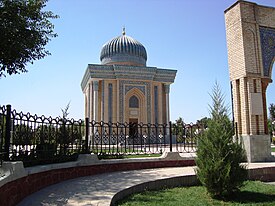Abu Mansur Maturidi
| Abu Mansur al-Maturidi | |
|---|---|

Tomb-shrine of Imam Māturīdī, Samarkand
|
|
| Theologian, Jurist; Great Articulator of Orthodox Theology, Leader of Guidance (Imām al-Hudā), Shaykh al-Islām, One of the Two Great Theologians, Diver into the Sea of Knowledge, Aʿraf al-nās bi-madhāhib Abī Ḥanīfa |
|
| Born | 853 Samarkand |
| Died | 944 Samarkand |
| Venerated in | Traditional Sunni Islam |
| Major shrine | Tomb of Imam Māturīdī, Samarkand |
| Controversy | His theology is controversial among contemporary Sunni movements that adhere to the Athari creed, such as the Wahhabism of Saudi Arabia |
Abū Manṣūr Muḥammad b. Muḥammad b. Maḥmūd al-Samarḳandī (853-944 CE; Persian: محمد بن محمد بن محمود أبو منصور ماتریدی سمرقندی حنفی), often referred to as Abū Manṣūr al-Māturīdī for short, or reverently as Imam Māturīdī by Sunni Muslims, was a Sunni Hanafi jurist, theologian, and scriptural exegete from ninth-century Samarkand who became the eponymous codifier of one of the principal orthodox schools of Sunni theology, the Maturidi school, which became the dominant theological school for Sunni Muslims in Central Asia and later enjoyed a preeminent status as the school of choice for both the Ottoman Empire and the Mughal Empire.
In contrast to Ashʿarī (d. 936), the founder of one of the other major orthodox Sunni theological schools, Maturidi adhered to the doctrine of Abū Ḥanīfa (d. 772) as transmitted and elaborated by the Hanafi theologians of Balkh and Transoxania. It was this theology which Maturidi systematized and used to refute not only the opinions of the Mutazilites, the Karrāmites, and other heterodox groups among the Sunnis, but also non-Muslim theologies such as those of Chalcedonian Christianity, Miaphysitism, Manichaeanism, Marcionism, and Bardaisanism.
...
Wikipedia
